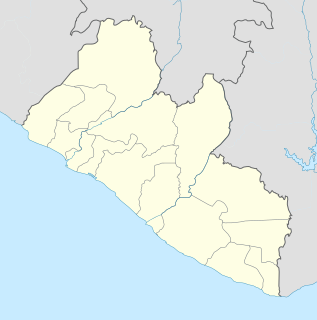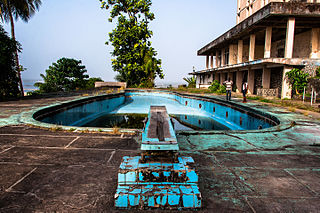 W
WLiberia is a country in West Africa which was founded by free people of color from the United States. The emigration of African Americans both free and recently emancipated, was funded and organized by the American Colonization Society (ACS). The mortality rate of these settlers were the highest in accurately recorded human history. Of the 4,571 emigrants who arrived in Liberia between 1820 and 1843, only 1,819 survived.
 W
WThe 1980 Liberian coup d'état happened on April 12, 1980, when President William Tolbert was overthrown and murdered in a violent coup. The coup was staged by an indigenous Liberian faction of the Armed Forces of Liberia (AFL) under the command of Master Sergeant Samuel Doe. Following a period of transition Doe ruled the country throughout the 1980s until his murder on 9 September 1990 during the First Liberian Civil War.
 W
WThe Monrovia clashes in 1998 were the result of Liberian President Charles Taylor's attempts to violently eliminate one of his last domestic political opponents, Roosevelt Johnson, a former warlord of Krahn ethnicity. At the time, Johnson still lived with a small loyal militia in Monrovia, the capital of Liberia. After some minor armed altercations, almost all of Johnson's followers were finally killed by Taylor's security forces during a major firefight in September 1998, though Johnson himself managed to flee into the United States embassy. After one last attempt by Taylor's paramilitaries to kill him there, causing a major diplomatic incident, Johnson was evacuated to Ghana. Although the clashes were effectively a political victory for Taylor as he had removed Johnson from Liberia, the mass killings of ethnic Krahn after the clashes contributed to the outbreak of the Second Liberian Civil War which saw the president being toppled.
 W
WDaniel Dulany Addison was an American clergyman and writer.
 W
WThe Center for National Documents and Records serves as the national archives of Liberia. It was headquartered on Tubman Boulevard in the Sinkor section of the city of Monrovia until 1992, when it moved to Ashmun Street. Directors have included Philomena Bloh Sayeh.
 W
WChocolate City is a central-northern suburb of Monrovia, Liberia. It is located in the New Georgia Township. Chocolate City contains the Elizabeth Blunt School and Francis Freeman Elementary School.
 W
WClay-Ashland is a township located 10 miles (16 km) from the capital city of Monrovia in Liberia. The town is in the St. Paul River District of Montserrado County. It is named after Henry Clay — a slaveowner and American Colonization Society co-founder who favored gradual emancipation — and his estate Ashland in Lexington, Kentucky.
 W
WThe Ducor Hotel is an abandoned luxury hotel in Monrovia, Liberia. Established in 1960, it had 106 rooms on eight stories. The hotel has fallen into disrepair after being occupied by squatters who were removed before a failed effort at a Libyan-funded renovation. The building sits on Ducor Hill, the highest point of the city, overlooking the Atlantic Ocean, the Saint Paul River and Monrovia's West Point district. It is located at the end of Broad Street across from United Nations Boulevard in Monrovia's main business district.
 W
WThe First Liberian Civil War was an internal conflict in Liberia from 1989 until 1997. The conflict killed about 250,000 people and eventually led to the involvement of the Economic Community of West African States (ECOWAS) and of the United Nations. The peace did not last long, and in 1999 the Second Liberian Civil War broke out.
 W
WGardnersville or Gardnesville is a township in the Greater Monrovia District, Liberia.
 W
WThe Independent National Patriotic Front of Liberia (INPFL) was a rebel group that participated in the First Liberian Civil War under the leadership of Prince Johnson. It was a breakaway faction of the National Patriotic Front of Liberia (NPFL).
 W
WThe Ivory Coast expedition, or the Liberia expedition, was a naval operation in 1842, launched by the United States against the West African Bereby people. After the attacks on the merchant ships Mary Carver and Edward Barley, the American Congress approved a punitive expedition to the area and placed Commodore Matthew C. Perry in command. The expedition was successful in exacting redress by destroying the fortified town of Little Bereby and by killing the chief responsible for the attacks on American shipping.
 W
WJoint Task Force Liberia was a joint task force formed from August to October 2003 in response to the crisis that developed during the Second Liberian Civil War. The ongoing civil war destabilized the area and created a large number of refugees as rebel forces closed in on Monrovia and took over Bushrod Island. As a result, the Freeport of Monrovia closed, causing food shortages.
 W
WThe Liberians United for Reconciliation and Democracy (LURD) was a rebel group in Liberia that was active from 1999 until the resignation of Charles Taylor ended the Second Liberian Civil War in 2003. While the group formally dissolved after the war, the interpersonal linkages of the civil war era remain a key force in internal Liberian politics.
 W
WThe Mano River Union (MRU) is an international association initially established between Liberia and Sierra Leone by the 3 October 1971 Mano River Declaration. It is named for the Mano River which begins in the Guinea highlands and forms a border between Liberia and Sierra Leone. On 25 October 1980, Guinea joined the union.
 W
WThe Maryland State Colonization Society was the Maryland branch of the American Colonization Society, an organization founded in 1816 with the purpose of returning free African Americans to what many Southerners considered greater freedom in Africa. The ACS helped to found the colony of Liberia in 1821–22, as a place for freedmen. The Maryland State Colonization Society was responsible for founding the Republic of Maryland in West Africa, a short lived independent state that in 1857 was annexed by Liberia. The goal of the society was "to be a remedy for slavery", such that "slavery would cease in the state by the full consent of those interested", but this end was never achieved, and it would take the outbreak of the Civil War to bring slavery to an end in Maryland.
 W
WMississippi-in-Africa was a colony on the Pepper Coast founded in the 1830s by the Mississippi Colonization Society of the United States and settled by American free people of color, many of them former slaves. In the late 1840s, some 300 former slaves from Prospect Hill Plantation and other Isaac Ross properties in Jefferson County, Mississippi, were the largest single group of emigrants to the new colony. Ross had freed the slaves in his will and provided for his plantation to be sold to pay for their transportation and initial costs.
 W
WThe National Transitional Legislative Assembly (NTLA) was Liberia's legislative body during the country's transition from civil war to democratic rule.
 W
WThe Republic of Liberia was founded by freed African slaves from North America by the American Colonization Society and returned to establish a republic on African soil. Shortly after their arrival, they were met by the indigenous people that inhabited the land. The Nationality law is set forth in the Aliens and Nationality Law of 1973, based on its 1847 Constitution. Current citizenship laws explicitly state being Black as a prerequisite to citizenship. The first constitution allowed for women to transmit their nationality to their children, although multiple citizenship was not permitted nor is it permitted in revisions of the constitution.
 W
WThe Republic of Maryland was a country in West Africa that existed from 1834 to 1857, when it was merged into what is now Liberia. The area was first settled in 1834 by freed African-American slaves and freeborn African Americans primarily from the U.S. state of Maryland, under the auspices of the Maryland State Colonization Society.
 W
WSandline International was a private military company (PMC) based in London, established in the early 1990s. It was involved in conflicts in Papua New Guinea in 1997 and had a contract with the government under then-Prime Minister Julius Chan, causing the Sandline affair. In 1998 in Sierra Leone Sandline had a contract with ousted President Kabbah and in Liberia in 2003 was involved in a rebel attempt to evict the then-president Charles Taylor near the end of the civil war. Sandline ceased all operations on 16 April 2004.
 W
WOperation Shining Express was the June 2003 deployment of an American naval task force, consisting of the amphibious assault ship USS Kearsarge (LHD-3) and the 3rd Battalion 2nd Marines (3/2) to rescue U.S. embassy personnel and American citizens during the Second Liberian Civil War. The deployment was announced on June 12, 2003 and lasted until July 2003.
 W
WRobert Field Stockton was a United States Navy commodore, notable in the capture of California during the Mexican–American War. He was a naval innovator and an early advocate for a propeller-driven, steam-powered navy. Stockton was from a notable political family and also served as a U.S. senator from New Jersey.
 W
WThe Liberian Truth and Reconciliation Commission (TRC) is a Parliament-enacted organization created in May 2005 under the Transitional Government. The Commission worked throughout the first mandate of Ellen Johnson Sirleaf after her election as President of Liberia in November 2005. The Liberian TRC came to a conclusion in 2010, filing a final report and recommending relevant actions by national authorities to ensure responsibility and reparations.
 W
WThe United Nations Mission in Liberia (UNMIL) was a peacekeeping force established in September 2003 to monitor a ceasefire agreement in Liberia following the resignation of President Charles Taylor and the conclusion of the Second Liberian Civil War. The peacekeeping mission formally withdrew on 30 March 2018. At its peak it consisted of up to 15,000 United Nations military personnel and 1,115 police officers, along with a civilian component. It superseded the United Nations Observer Mission in Liberia (UNOMIL). As of July 2016, 1,240 U.N. military and 606 police personnel remained on the ground, but were there only in case of emergency.
 W
WThe United Nations Observer Mission in Liberia (UNOMIL) was a United Nations peacekeeping mission in Liberia. It was established in Resolution 866 (1993) and headquartered in the capital Monrovia.